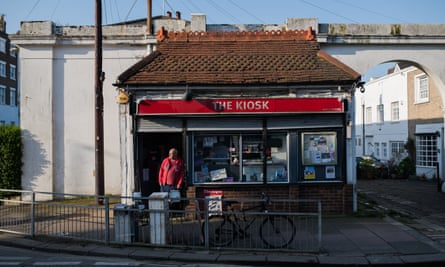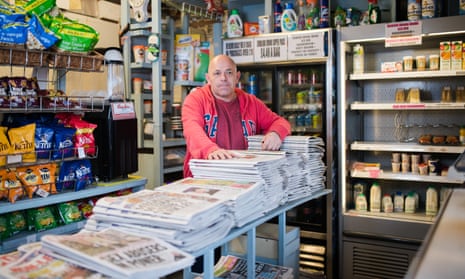This is an achingly sorry tale about thwarted personal effort, the slow death of an industry, the worrying nature of changes in employment practice and, most of all, about the dangers of monopoly.
The fact that the central character in this story is my own newsagent, does not indicate special pleading because, after looking deeper into the issue, it is clear – as will emerge – the crisis is a national one.
I have been loyal to my newsagent in Brighton for the best part of 40 years. The shop changed hands several times before it was acquired in 2007 by a man who soon proved to be far more efficient than any previous owner.
Guy Wright imposed order on the enterprise, oversaw a well-organised delivery system and introduced computerised billing. Most important of all, he was helpful and amiable, always stressing that business is about people. By 2009, he was doing so well that I reported on his opening of a second shop, at Brighton Marina.
That certainly bucked the national trend because newsagents were closing down across Britain in the face of competition from supermarkets and petrol stations.

Although his spin-off venture didn’t last long, his central concern, a corner shop in Brighton’s Kemptown known as The Kiosk, thrived. At the time, despite the gradual decline of newsprint, his team of adult delivery men – because, he says, “they are more dependable than schoolchildren” – were serving 250 people a day. Gradually, that number has dwindled to 150.
Even so, that’s a substantial total in these online times and his business remains profitable. But Wright has reluctantly decided to close down after suffering what he regards as “months of hell” due to the service he has received from the region’s newspaper wholesaler, Smiths News, part of the Connect Group, which boasts: “We win trust by giving outstanding service.”
Along with other customers, I have been upset by the number of times our newspapers have arrived late. Wright patiently explained to complainants, including me, that it was due to the late delivery of the papers to his shop by the wholesaler.
Further investigation revealed the astonishing reasons for that lateness. The wholesaling system, the key link between newspaper publishers, retailers and, ultimately, customers, has all but collapsed in the Brighton region.
Wright believes that customers who pay for papers to be delivered should have them by 7.30am. That was easy enough to achieve when the bundles arrived at his shop at 6am, as was the case for 10 years.
But the wholesale delivery time has become a moving target over the past few months. It is rare for the papers to reach him in time to give customers an adequate service. There have been occasions when they have arrived beyond 8am. On one infamous Saturday, the day when papers achieve their highest sales, the delivery was at midday.
Getting in touch with the Smiths News depot, in Lancing, West Sussex – about 10 miles from Brighton – proved difficult and expensive. “I was often held in a queue on a premium-rate line,” says Wright. “Many times, after 20 minutes, it simply dropped the line.” There is an app, but this doesn’t enable him to deal with problems in real time.
So Wright took matters into his own hands. On days when he was able, instead of awaiting the late arrival of his papers, he drove to the depot to collect them himself, as did a neighbouring newsagent, Kanak Patel of Shiv News. Yet Smiths News still insisted that they pay the carriage charge.
It enabled Wright to talk at length to the depot manager who was sympathetic. There was little she could do, she told him. It was down to the drivers, who are self-employed freelancers. Some hold contracts and employ drivers, while some subcontract the work.

Wright found that several drivers assigned to his route were new immigrants with poor English and no knowledge of the area.
Wright and Patel cannot go elsewhere for a better service, however, because Smiths News holds the wholesale monopoly in the area, as it does in many regions across Britain.
I thought this might be an untypical incidence, a one-off. So I contacted the body that represents newsagents across Britain, the National Federation of Retail Newsagents (NFRN) and told Wright’s story to its communications manager, Anne Bingham.
She wasn’t surprised. “It’s happening up and down the country,” she says. “We have scores of examples.” It is one of the main reasons the NFRN called on 11 April for the Competition and Markets Authority (CMA) to examine the news supply chain.
The NFRN’s president, Linda Sood, submitted what she referred to as “an explosive 32-page document”, which argues that hundreds of independent newsagents have been forced to close because of the monopolistic nature of newspaper distribution.
It states that because news wholesalers enjoy “absolute territorial protection”, they have little incentive to provide an adequate service to retailers who cannot switch suppliers. It refers to the deteriorating service – as evidenced by Wright – and points to spiralling carriage charges and reduced margins.
These problems led to a protest in September last year by a group of 30 retailers outside Smiths News’s headquarters in Swindon. As Sood says: “Independent news retailers feel under siege from all corners of the supply chain.”
Of course, there are two other big factors. Corner shops have been dying for years and it is undeniable that newspaper sales have been falling with increasing rapidity throughout the past 20 years. Even so, should we be happy about hastening the demise of both?
Smiths News concedes that Wright has suffered from “a serious issue”, which the company says it is investigating. “Mr Wright has a fair point and, based on our findings, we’ll be looking at this in as broad a way as possible,” says Freda Cronk, head of brand and marketing.
She contests some of his claims, arguing that – according to company records – he has picked up bundles of papers from the depot on only three occasions. A fourth occurred last Friday. But she adds: “We do not expect, or want, customers picking up their supplies.”
Cronk defended the use of self-employed contract drivers as “the most efficient and flexible model for delivering newspapers” and says their performance was “actively managed”, adding: “We will terminate contracts if they do not meet the expected standards.”
Whatever the investigation discovers, it will probably be too late to change Wright’s mind about closing his business. And he will take his place in a lengthening line of discouraged former newsagents.
As for editors and journalists who put so much effort into producing newspapers, they will surely read this story and weep. They might do better, however, to ask why their publishers are so relaxed about monopolistic practices in the wholesale trade.

